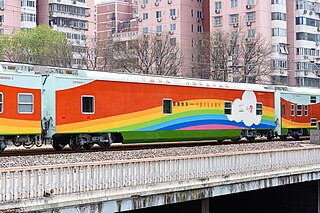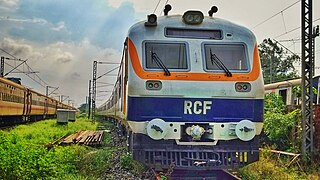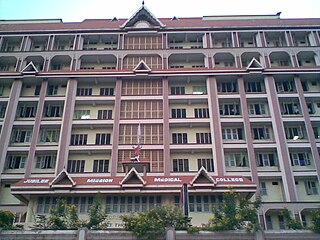
Indian Railways (IR) is a statutory body under the ownership of the Ministry of Railways, Government of India that operates India's national railway system. It manages the fourth largest national railway system in the world by size, with a total route length of 68,043 km (42,280 mi), running track length of 102,831 km (63,896 mi) and track length of 128,305 km (79,725 mi) as of 31 March 2022. 58,812 km (36,544 mi) of all the gauge routes are electrified with 25 kV 50 Hz AC electric traction as of 1 April 2023.
Perambur is a neighbourhood located in the northern region of Chennai, Tamil Nadu, India.

Adventist HealthCare Shady Grove Medical Center is a 266-licensed bed acute care facility located in Rockville, Maryland. Shady Grove Medical Center provides a range of health services to the community such as high-risk obstetrical care, cardiac and vascular care, oncology services, orthopedic care, surgical services and pediatric care. Opened in 1979 as Shady Grove Adventist Hospital, Shady Grove Medical Center operates as part of Adventist HealthCare, a health-care delivery system that includes hospitals, home health agencies and other health-care services. Adventist HealthCare is headquartered in Gaithersburg, Maryland.

The Government Medical College, Thiruvananthapuram is in Thiruvananthapuram, India. Founded in 1951, it was inaugurated by Prime Minister Jawaharlal Nehru and is Kerala's first ever Medical College.
TheQueen Elizabeth Hospital (TQEH) is an acute care teaching hospital in the western suburbs of Adelaide, South Australia. It provides a range of health services, including inpatient, outpatient, surgical, emergency and mental health services.

Middlemore Hospital is a major public hospital in the suburb of Ōtāhuhu, Auckland, New Zealand. The hospital has approximately 800 beds. There are 24 operating theatres across two sites.
IMPACT is an international initiative which focusses on preventive and social health and promote awareness and intervention to prevent avoidable disability. Founded in 1980s by Sir John Wilson, IMPACT was formed as a part of the UN's Decade of disabled people. The UK IMPACT Foundation (UKIF), which is the central organisation to its sister projects over the world, was formally registered as a charity in 1985. The organisation's international programme was formally set up by the United Nations General Assembly supported by the British government. Although it does not receive any financial assistances from these organisations, it is jointly promoted by the World Health Organization, UNICEF and the UNDP. IMPACT currently has projects focussing on disability prevention, social health, nutritional health, child health as well as disaster relief in some of the least developed nations in Asia and Africa, including countries like Bangladesh, Cambodia, India, Nepal, East Africa. The India wing of IMPACT also leads Community Health Initiatives in Rural Areas and is actively involved in initiatives to prevent infant mortality.

A hospital train is a railway train with carriages equipped for the provision of healthcare. Historically this has ranged from trains equipped to transport wounded soldiers, with basic nursing and first aid facilities on board, to fully equipped mobile medical centres, sometimes including operating theatres and nursing wards.

Lifeline Express is a charitable organization that attempts to reduce blindness in China. Since 1997, the organization has operated rainbow-coloured hospital "Eye-Trains," which provide free cataract surgery to patients in rural parts of China. In addition, Lifeline Express promotes ophthalmological training for Chinese doctors, through constructing training centers and inviting foreign doctors to China as consultants, and builds solar hot water systems in remote parts of China.

On Indian Railways, the MEMUs are electric multiple unit (EMU) trains that serve short and medium-distance routes in India, as compared to normal EMU trains that connect urban and suburban areas. The acronym stands for Mainline Electric Multiple Unit.

Jubilee Mission Medical College and Research Institute is a private, non-profit Christian minority medical college, hospital and research institute located at Thrissur in Kerala, India. The establishment is administered by the Jubilee Mission Hospital Trust, a charitable organisation under the Catholic Archdiocese of Thrissur.

Adventist HealthCare White Oak Medical Center is a hospital with 180 private patient rooms and serves patients in Montgomery, Prince George's, and surrounding counties.
The public healthcare system in India evolved due to a number of influences since 1947, including British influence from the colonial period. The need for an efficient and effective public health system in India is large. Public health system across nations is a conglomeration of all organized activities that prevent disease, prolong life and promote health and efficiency of its people. Indian healthcare system has been historically dominated by provisioning of medical care and neglected public health. 11.9% of all maternal deaths and 18% of all infant mortality in the world occurs in India, ranking it the highest in the world. 36.6 out of 1000 children are dead by the time they reach the age of 5. 62% of children are immunized. Communicable disease is the cause of death for 53% of all deaths in India.

Tiruchirappalli railway division(Tamil: [ திருச்சிராப்பள்ளி ரயில் கோட்டம்]) is one of the six railway divisions of Southern Railway zone (SR) of India. It has its administrative headquarters located at Tiruchirappalli. It serves most of the districts of delta region and Central Tamil Nadu.
The Orange Health Service is a public hospital located on the Bloomfield Health Campus, approximately 4 km (2.5 mi) south of the city Orange, New South Wales in Australia and is operated by Western NSW Local Health District.
Southern Railway Headquarters Hospital, also known as the Perambur railway hospital, is a 500-bed hospital of the Southern Railway located in Ayanavaram, Chennai. It is spread across a land measuring 15 acres (6.1 ha) and was established during the British rule in India. The hospital has specialized in 15 basic disciplines and super-specialized in 3 disciplines. The National Board of Examination (NBE) has accredited the hospital for recognition in postgraduate training. The hospital has also been accredited by international institutions such as Royal College of Surgeons for imparting training in PG courses. It is also an approved institution for training nurses.
Shrimad Rajchandra Hospital is a charitable, multi-bed hospital located in the city of Dharampur in the Valsad district of Gujarat, India. The hospital currently operates under the administration of Shrimad Rajchandra Love and Care, a non-governmental organisation (NGO) which runs the hospital and other charitable activities. Established in 2003, it provides medical care at nominal rates or completely free of cost. Hospital records show that over 125,000 patients were treated in 2016, and over 1 million patients have been treated since the inception of the hospital in 2004.
A multiple-unit train or simply multiple unit (MU) is a self-propelled train composed of one or more carriages joined together, which when coupled to another multiple unit can be controlled by a single driver, with multiple-unit train control. Although multiple units consist of several carriages, single self-propelled carriages such as railbuses and trams – are in fact multiple-units when two or more of them are working connected through multiple-unit train control.
Bindu Menon is an Indian neurologist, health activist, researcher and academician from Andhra Pradesh. She is known for providing free treatment to patients with Neurological disorder in rural areas of India through her organization, the Dr. Bindu Menon Foundation. She runs an initiative called Neurology-on-Wheels, offering free healthcare services to remote areas since 2013.












